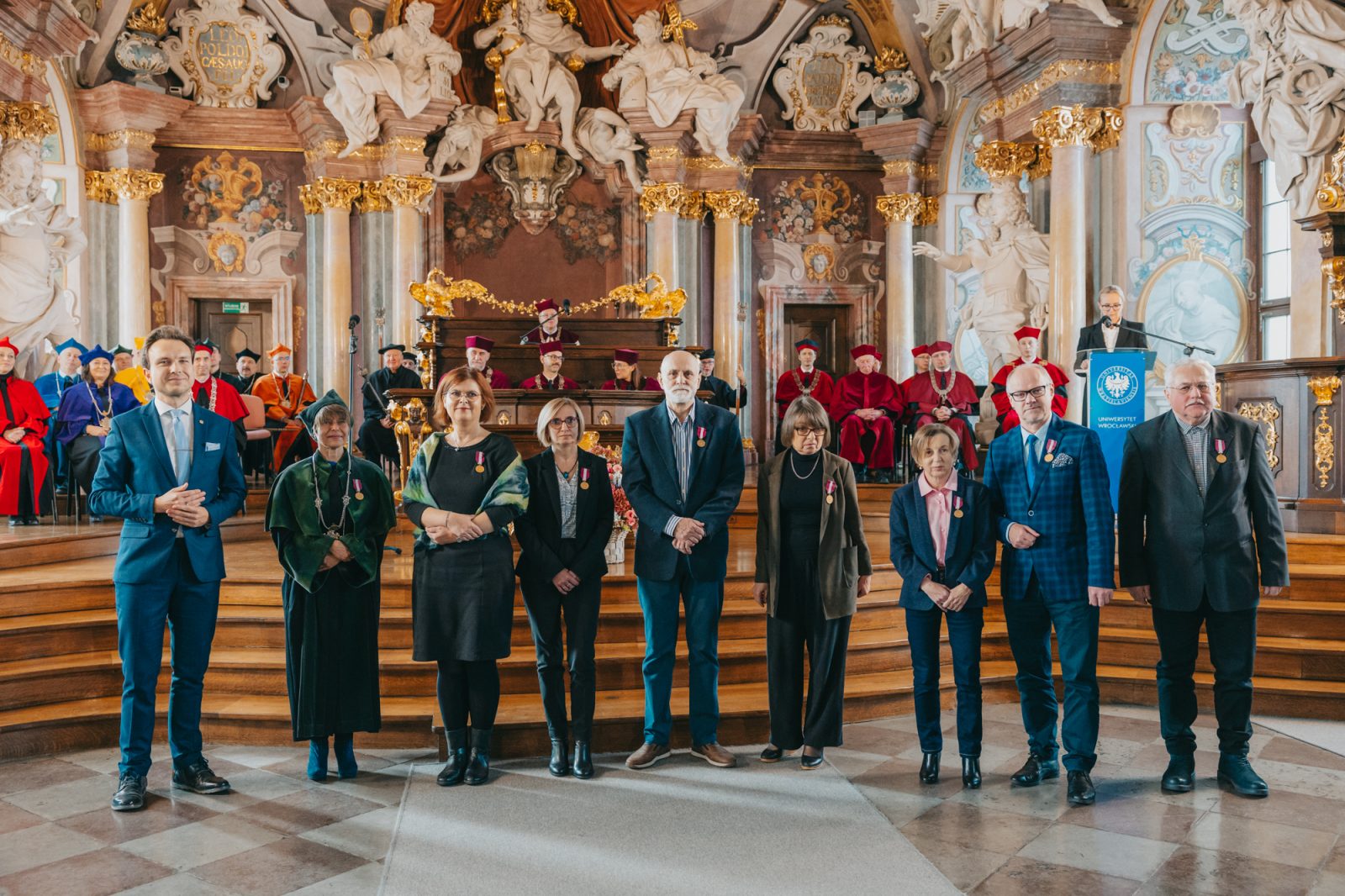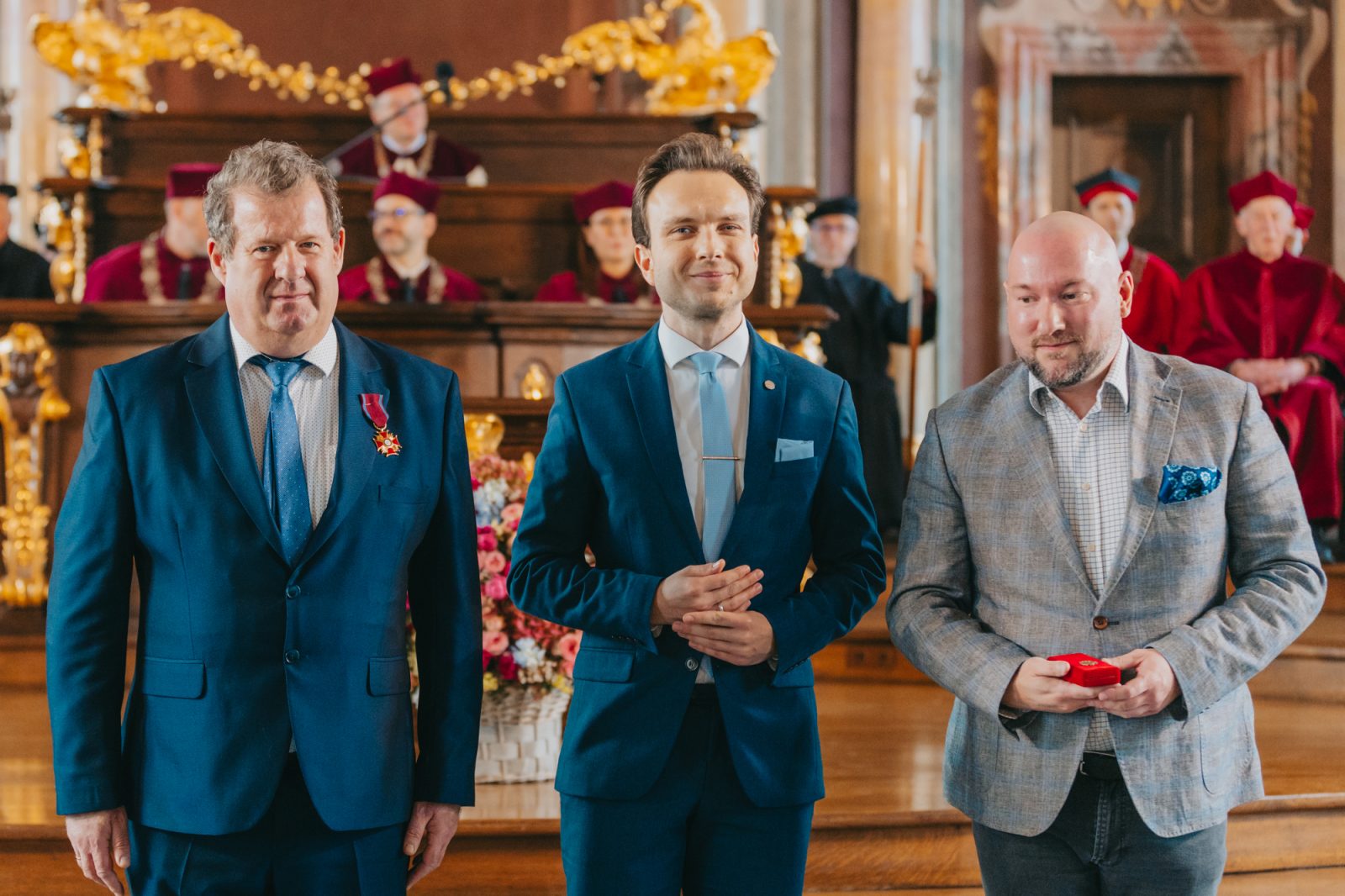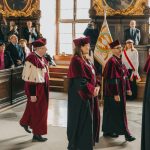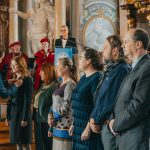
Celebration of the University of Wrocław
On 15 November, the University of Wrocław celebrated its holiday.
All those gathered that day in the Aula Leopoldina were welcomed by Katarzyna Górowicz-Maćkiewicz, UWr spokeswoman.
There was also a speech by the Rector of the University of Wrocław, professor Robert Olkiewicz:
“Dear colleagues, friends of our University,
15th November is a symbolic date for two reasons. First, in 1702, the Leopoldina Academy was inaugurated. Also on that day, the first academic year at the Polish university in Wrocław began with a lecture by prof. Kazimierz Idaszewski.
In the morning we laid flowers at the monument, which reminds us what war, hatred and evil lead to. The murder of Lviv professors on the Wuleckie Hills in July 1941 is one of the most tragic events in the history of Polish science. The Nazis executed the lecturers of Jan Kazimierz University, Lviv Polytechnic, their relatives and friends.
Maintaining traditions and remembering significant events are important and part of the university’s order. Without passing on to each other certain rules of conduct, traditions, customs – we would not be here.
Today is University Day. Today, it is worth tempting to give a positive summary of the past year. Recall that this year marks the beginning of the two new faculties of Languages, Cultures and Literatures and Social Communication and Media. This will certainly bring many benefits and streamline administration.
In a moment you will receive awards and prizes in gratitude for your commitment and work for our University and more broadly for the scientific community of our city and region. Without your efforts and commitment, there would be no such successes.
It is impossible to list today all the awarded and distinguished grantees, young scientists or experienced researchers.
Undoubtedly, one of the more prestigious awards was the so-called “Polish Nobel” for prof. Marcin Wodzinski, i.e. the award of the Foundation for Polish Science.
The prestigious appointment was given to UWr Faculty of Law, Administration and Economics lecturer dr Anna Adamska-Gallant, who was elected a judge of the European Court of Human Rights on 1 October 2024. Congratulations!
I will also remind you that, in turn, prof. Stanislaw Bereś received this year’s Wrocław Scientific Award, and prof. Jakub Kierczak of the Department of Experimental Petrology at the Institute of Geological Sciences received this year’s medal of scientific excellence from the European Mineralogical Union. Anyway, in this field we can also boast new patents and discoveries, such as the recent discovery of a mineral containing valuable scandium by dr Adam Szuszkiewicz.
I will also mention the Andreas Gryphius Prize for our researcher prof. Edward Białek, a literary historian, awarded for his significant contribution to promoting dialogue between Poles and Germans.
Our young researchers have received city and ministerial scholarships, and have been recognized for their research, articles, and theses by, among others, the Polish Physical Society for Damian Śnieżek, in the International Stefan Banach Competition for Karol Duda, and by the Association for Philosophy of Law and Social Philosophy for Jan Klakla.
Our graduate, dr Wojciech Szczerbowicz, has just been awarded for the best doctoral thesis by the Polish Society for International Studies. This year, two of our students Bartosz Rusin, a physics student, and Kacper Rosner-Leszczyński, a history student, were in the finals of the Student Nobel Prize. The award went to Kacper Rosner-Leszczyński. It is worth noting that our university was chosen by a high school graduate who was among the 24 people who passed matriculation the best in Poland. Ms. Karolina Krzonkalla is studying law. We are proud and heartily congratulate you!
In turn, Individual Studies in Computer Science and Mathematics and Computer Science are two of our fields of study that were awarded Certificates of Educational Excellence by the Presidium of the Polish Accreditation Commission back in February. The University of Wrocław has received a grant from the European Union for the project “University of Wroclaw: Development of Personnel for the Lower Silesian Labor Market” – We will train more than 1,500 people to increase their competitiveness in the labour market.
The year 2024 was a year of hosting many important events and conferences. The University organised, among other things, a forum for educators, a forum for Polish didactics or a congress of young mathematicians, and our geology students went on a research cruise on the Baltic Sea. I was particularly pleased with the First University Conference “Artificial Intelligence” initiated at the Faculty of Mathematics and Computer Science.
We also have behind us the first open debate on the situation in the Middle East, and in a few days – another open debate, dedicated to the situation of Ukraine, to which you are already cordially invited. In doing so, we show that our role as academics is to discuss things factually, based on facts, to be responsible for words and actions, and to act within the framework of the applicable law.
Finally, some optimistic data. I will focus here only on the figures for the grants obtained from the National Science Centre. In 2024, they are: 84 grants (domestic and foreign) amounting to more than PLN 77 million. Let’s hope that’s not all, because this year will still see decisions from MINIATURA8, OPUS27 and PRELUDIUM23.
In addition, the negotiation stage of the university’s “University of Wrocław as a more accessible university” project, submitted to the “Universities increasingly accessible” competition, has just been successfully completed. The amount of the project: nearly PLN 8 million.
Ladies and gentlemen, I hope that the next year will bring many good things for our University. What I wish for you and myself!
After the Rector’s speech, employees of the University were awarded: 1 Gold, 2 Silver and 3 Bronze Crosses for meritorious activity in the development of science, and 60 Medals for Long Service (27 Gold, 22 Silver and 11 Bronze) – for exemplary, exceptionally conscientious performance of professional duties. Many employees have also been honored with departmental awards bestowed by the Minister of National Education for special contributions to education and upbringing – this year 16 Medals of the National Education Commission were awarded. The medals, awarded in previous years, were also presented.
The Gold Cross of Merit was awarded to:
- the late prof. Witold Kwaśnicki of the Faculty of Law, Administration and Economics
- prof. Krzysztof Stefaniak from the Faculty of Biological Sciences
The Silver Cross of Meritwas awarded to:
- prof. Jolanta Blicharz from the Faculty of Law, Administration and Economics
- dr Marek Kulczycki from the Faculty of Social Sciences
- dr Dariusz Szrejder from the Faculty of Social Sciences
The Bronze Cross of Merit was awarded to:
- dr hab. Joanna Dyduch from the Faculty of Social Sciences
- prof. Marcin Kadej from the Faculty of Biological Sciences
- prof. Józef Krawczyk from the Faculty of Biological Sciences
- dr Adrianna Michalewska from the Science Department
- dr hab. Małgorzata Niklewicz-Pijaczyńska from the Faculty of Law, Administration and Economics
- prof. Aldona Wiktorska-Święcka from the Faculty of Social Sciences
This year’s recipient of the Andreas Gryphius Prize was prof. Edward Białek, a literary historian from the Institute of German Studies at the University of Wrocław. This is an award for contributions to promoting dialogue between Poles and Germans. The Andreas Gryphius Prize, under the patronage of the Silesian playwright of the Baroque period, honors writers and translators who bring closer the development of German culture in various historical periods in central, eastern and southern Europe and contribute to understanding between Germans and other peoples of our continent. It is awarded by the Esslingen Artists Guild. Prof. Edward Białek’s research interests include the literary movement in Germany and Austria and German literature from Silesia. His teaching activities include literature by German authors from Silesia, writing for children and young people in language teaching and literary translation.
Awards were also presented to academic staff for scientific, teaching and organisational achievements achieved in 2023. Awards were given to:
- prof. Radosław Antonów from the Faculty of Law, Administration and Economics
- prof. Justyna Bajda from the Faculty of Letters
- prof. Michał Białek from the Faculty of Historical and Pedagogical Sciences
- dr hab. Anetta Drzeniecka-Osiadacz from the Faculty of Earth and Environmental Management
- prof. Petr Heinzel from the Incubator for Scientific Excellence – Activity of the Sun and Stars at the Faculty of Physics and Astronomy
- dr Małgorzata Madej from the Faculty of Social Sciences
- prof. Adrian Marciszak from the Faculty of Biological Sciences
- prof. Katarzyna Nowak-McNeice from the Faculty of Languages, Cultures and Literatures
- dr Aleksandra Simiczyjew from the Faculty of Biotechnology
- dr hab. Anna Skarżyńska from the Faculty of Chemistry
- dr hab. Paweł Urbaniak from the Faculty of Social Communication and Media
- dr hab. Anna Wysoczańska-Kula from the Faculty of Mathematics and Computer Science
In the competition for the publication of a book in the Golden Series of the University of Wrocław, the golden book of the year 2024 was awarded to prof. Robert Kołodziej of the Historical Institute for his work entitled “Vincula albo źródła ad alveum sejmu confluentem. Sejmiki w systemie parlamentarnym Rzeczypospolitej za panowania Jana III Sobieskiego”. On behalf of the winner, the award was received by the Dean of the Faculty of Historical and Pedagogical Sciences, prof. Paweł Klint.
The Vocal Ensemble led by Łukasz Czartowski took care of the musical setting of the ceremony.
Photo report: Dominika Hull-Bruska









































































































